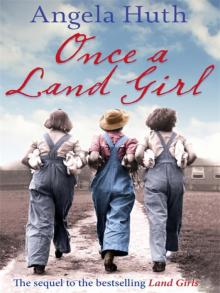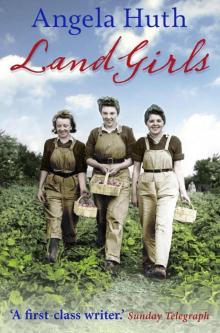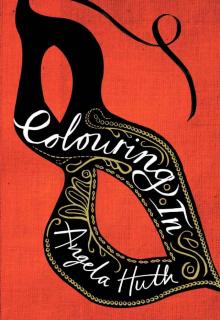- Home
- Angela Huth
Nowhere Girl
Nowhere Girl Read online
Nowhere Girl
Angela Huth
Contents
Chapter One
Chapter Two
Chapter Three
Chapter Four
Chapter Five
Chapter Six
Chapter Seven
Chapter Eight
Chapter Nine
Chapter Ten
Chapter Eleven
Chapter Twelve
Chapter Thirteen
Chapter Fourteen
Chapter One
My first husband, Richard Storm, was buried on a hot August day in the suburbs of London. When the funeral was over, a dozen of us, relations and friends, drove away in a procession of big black cars. Their seats had been built to force passengers into upright positions of respect. We sat uncomfortably and no-one spoke a word.
Richard’s parents lived in a dark flat near Hyde Park. At their invitation we joined them there to re-form the funeral group we had made round the coffin, only this time it was round a table laid with fishpaste sandwiches. We drank sweet sherry and talked in cheerless tones appropriate to the occasion.
I left at four, the first to leave, and walked into the park. It was very hot, oppressively hot. The trees were quite still, like trees under snow. People walked slowly, or slept on the grass, careless of their appearance, legs apart, hands straggling over faces, like people on a beach. The sherry still tasted horrible in my mouth, and the skirt of my black dress clung damply to my legs.
There was no hurry. There was nothing to hurry for, and it was too thundery to hurry.
I sat on a bench. It was already half-occupied by two old women. They sat alert, on the very edge of the bench, as if they were about to move, but were waiting for some signal. In a way, they resembled some of the old people who had been at the funeral, except they were poorer. The one farthest from me was shrivelled into a bow shape, scraggy and grey. Grey skin, grey eyes, black coat faded almost to grey. She stared straight ahead and let the ugly knots of her hands lie dead in her lap.
The one nearest to me looked healthier, altogether sprightlier. She too had a black coat, but a poppy left over from some long past Poppy Day stuck in the brim of her hat.
She turned to me and said:
‘You can hear the buses from here, can’t you? That’s nice.’
I listened. I could hear the rumble of buses.
‘So you can,’ I said.
‘That’s what I like about it here. You can sit down and listen to the noise, and yet you’re in a nice bit of green.’ She looked at the prickly hedge opposite our bench, the rim of scorched grass by the path, the litter-bin, and a motionless tree. ‘Oh no,’ she went on, ‘I’ve nothing to grumble about now, have I? I never liked the quietness of the old days, you know. What I like is a supermarket on a Saturday morning. Or those demonstrations in Trafalgar Square. As a matter of fact, I was at one of those not long ago. I’m not quite sure what it was all about, to be honest, but there I was shouting away with the rest of them, and one of those policemen nearly took me away in a van. “Not on your life, officer,” I said to him. “There’s no law against innocent shouting. Besides, I’m enjoying myself.” And his hands just fell away from me.’
She smiled. Her voice was quiet, but not so quiet as Mrs Storm’s had been. Mrs Storm was Richard’s mother. My presence at his funeral had embarrassed her. She had nodded to me in the church, and looked confused. Later, in the hot brown room, sickly with the smell of nervous sweat, she shook my hand and said:
‘Oh, Clare, how nice to have the chance to see you again.’ Then she coughed, and blushed a deep yellow-pink, realising that was not what she had meant.
She wore a musquash coat. All the women seemed to be in musquash coats, in spite of the heat. A mournful fur. They held their sherry in damp hands that left fingerprints on their glasses. They were hungry for the fishpaste sandwiches which Mrs Storm handed round. A gathering of mustard and cress had caught up in the short grey hairs on her top lip. She must have been conscious of them, because when I went to say good-bye her small mauve tongue darted to the corners of her mouth, and she bumped nervously against her husband like a pigeon on a high ledge.
The old woman on the bench was talking again.
‘My sister, now,’ she was saying, ‘my sister is quite different from me. She doesn’t agree with me at all.’ She nudged the other old woman who turned reluctantly towards me. An empty face. A portrait whose oil paint has been scraped from it, leaving nothing but a faint drawing beneath. She blinked, so slowly that when her lids lowered I had a feeling that they wouldn’t rise again.
‘My sister always was the quiet one. Her name’s Edith. Edith Smith. She never married, you see.’ With her right hand Edith Smith’s sister rubbed at the rings on the third and fourth fingers of her left hand. Next to her wedding ring she wore a small, dark ruby ring set in silver. On her third finger, a round, pearly blue star-sapphire. The fine rays of its star glinted in the sun. ‘And my name is Ethel Fox. Mrs Henry Fox, though Henry died fourteen years ago.’ Edith Smith blinked slowly again, in confirmation of all this.
‘It’s one of Edith’s days in London,’ Mrs Fox went on. ‘She lives in the Gulliver Old People’s Home in Herne Bay, and she’s allowed up twice a year. Usually, we have a good time. But it’s been rather heavy to-day, and Edith’s feet are aching.’ One of Edith’s shiny black walking shoes twitched almost imperceptibly. ‘Still, we had a nice lunch in Lyons, then bought some embroidery silks in Barkers. – Edith’s good with her hands,’ she added.
We sat in silence for a while. The air was still and lifeless, like it sometimes is before an August storm. The sky was piling up with sour green clouds. Mrs Fox was looking at them.
‘It’s rather far to go back to my flat,’ she said, ‘all the way to Earl’s Court. And anyway, what can two people like us do just sitting in a room?’ At that moment two large drops of rain broke on the path by our feet. Mrs Fox brightened.
‘It’s coming on to rain,’ she said. ‘Edith, it’s coming on to rain. For myself, I don’t mind being caught in a shower because I never catch colds. But it’s Edith we must think of. Edith, come along.’
The two old women stood up. Mrs Fox took her sister’s arm.
‘Where do you think we should go?’ she asked. Standing, she held herself very straight. Beside her, Edith Smith sagged, a crumpled piece of indeterminate grey, and yet she lacked that quality of inconspicuousness that makes some people stand out in a crowd.
‘You could come back with me,’ I said.
‘That’s the answer,’ said Mrs Fox. ‘We’ll come back with you.’
We hurried along, the three of us, our heels rattling out-of-step on the pavements, past the Albert Hall, down the Exhibition Road. The rain thumped down slowly but spitefully. We concentrated on speed. At the funeral, the coffin bearers had concentrated on careful slowness. They were very good at it, and didn’t joggle the coffin on their shoulders. Their lips were sucked in with concentration so that their mouths were thin pencil lines. At the church they all took off their top hats with one gesture, like chorus men in a variety show.
We reached the house – small, trim, pretty, in a narrow cobbled mews. Geraniums in the window boxes flared scarlet against the white paint. The gilt door-knocker and knob were of matching intricate design.
‘I’ve always wondered what sort of people lived in these sort of houses,’ said Mrs Fox, as I opened the door.
In the sitting-room Edith Smith at once fell back on to the sofa, tired. Her weight barely made an impact on the fat cushions. Mrs Fox stared curiously at a picture of Richard above the fireplace. A crayon drawing he had done in Salisbury as a present for our first wedding anniversary. He was dressed in naval uniform, sharp, antiseptic – attractive,
I had thought, at seventeen. A mild but distant face. Certainly he didn’t look the sort of man who would marry a girl twenty years younger than himself, treat her like a spoilt child for a couple of years, then desert her for a middle-aged woman called Matilda he met one leave in Barcelona. Our divorce had been very easy. Plain desertion. And Richard had remained friendly. He sent me cards on my birthday and at Christmas, and encouraged Matilda to send me boxes of liqueur-filled chocolates.
‘That your husband?’ Mrs Fox asked.
‘It was, but he died. That’s my husband now.’ I pointed to a photograph of Jonathan in a silver frame. A kind but weak face, a little fleshy under the re-touched eyes, the mouth too full and high for its width.
‘Oh, I see.’ She fingered the frame. ‘Is he musical?’
‘Not particularly. He likes Strauss.’
‘I thought he might be. He’s got a musical face. But then Henry looked musical, and he couldn’t tell Haydn from Mozart. So you never can tell.’ She walked over to the record player. ‘Could we put something on?’
‘Strauss?’
‘Oh no, not in this rain. Have you anything by the Beatles?’
I put on a record.
‘“Lucy in the Sky,”’ said Mrs Fox. ‘I’d like Edith to hear that.’ She turned up the volume herself and smiled. Edith Smith shut her eyes. I went to get the tea.
The time the sisters took to eat seemed to go very slowly. Mrs Fox and I nodded and smiled to one another as the biscuits were passed to and fro. Edith appeared as ex-communicated as ever. She toyed with a ginger biscuit, licking small bits round the edges to make it soft before she trusted it to her small, white, unsteady teeth. I wondered if she was deaf, or dumb, or both.
‘There’s nothing the matter with Edith, is there, Edith?’ Mrs Fox shouted at me, suddenly, above the music. ‘She just gets overawed by London, you know. Well, I mean, wouldn’t you if you’d been in the Gulliver nine years?’
I nodded. She picked up a slice of supermarket chocolate cake, held it close to her face to approve it, and spoke more quietly.
‘And I was wondering why you are wearing so much black, at your age?’
I wore the black cotton dress I had quickly bought that morning, and a black wool beret with a pom-pom on top that Jonathan had bought me in Switzerland for snowballing. I took it off, shook out my hair, and explained I’d been to a funeral.
She asked who had died. I knew the name would mean nothing to her, but she seemed to anticipate a truthful answer. I told her Richard Storm.
‘Oh.’ She was disappointed. ‘I don’t know why, but I thought it might have been one of Henry’s friends. They’re dying all over the place, these days, I hear. Was this a much younger man, then?’
‘Forty two. He died of a heart attack.’
‘Any relation?’
‘My first husband.’
‘You mean the one up there?’ She looked towards the picture. ‘Oh lord, your first husband. Well, I suppose that meant you had a hand in the service. Did you give him a good march?’ I had had no part in the funeral arrangements, I explained. I had even forgotten who had composed the funeral march played at the service. Mrs Fox clucked with disapproval.
‘When Henry died, now,’ she said, ‘I gave him the best funeral you can imagine. People came from miles round to hear it, didn’t they, Edith?’ Edith moved her head, perhaps remembering. ‘I got the Salvation Army to top up the organ, you know, so that when we went outside with the coffin they could come with us. They played Chopin’s funeral march, but, of course, we reached the grave long before they’d finished. So we stood for quite five minutes, wasn’t it, Edith? – beside the grave, just marking time. At least, that’s what I was doing, just like the Guards. Oh, it was lovely, I can tell you.’ She put her cup to her lips but put it down again, smiling, without drinking.
‘People said they’d never heard a funeral like it. The vicar, he said it was all against regulations. I had a little trouble with him, but in the end he let me have it my way. – Mind you, he did quite well out of it. I sent him a record – what was it called, Edith? Anyhow, massed brass bands playing folk tunes at the Albert Hall.’ She picked up her cup again and drank this time with swift, silent sips like a bird.
‘Funnily enough, just as the band stopped we had a lo of aircraft overhead. All screaming, those very big planes – I like the noise they make, high up. As a matter of a fact, I had quite a job to hear the vicar. I was following in my prayer book, but he’d finished dust to dust before I got there. I remember thinking how Henry would have laughed.’
The record had come to an end and we could hear the rain. It was five o’clock.
‘Come along, Edith,’ she cried. ‘The bus to Victoria. We’re going. No dawdling, now. Your feet have had a good rest.’ She pulled on a pair of transparent nylon gloves, then took one of them off again to check with a naked hand the Poppy Day poppy in the brim of her velour hat. Edith Smith rose and made for the door, head down, preserving her silence to the end. At the door, she offered me a clenched hand, tightly packed into an old wool glove. But when I tried to take it, she quickly withdrew it, as if she thought it would repel me, but politeness had forced her to make the gesture.
‘Come again,’ I said to Mrs Fox.
‘Well, I don’t know your name, but I might.’
‘Lyall. Clare Lyall. How about Tuesday?’
‘Mrs Lyall, Tuesday.’ She gave a little skip after her sister. ‘Tuesday tea. Well, Mrs Lyall, I’m not sure, but I think I could fit in tea on Tuesday.’
‘Make it about four thirty,’ I said.
‘Four thirty, Tuesday. I’ll be here, then. Come along, Edith, or you’ll miss your coach.’
I opened the front door and Edith shuffled past us out into the rain. She was huddled up like someone on a very cold day, reluctantly independent.
‘She never likes going back,’ said Mrs Fox. ‘You can tell.’
*
When they had gone I went back to the sitting-room, meaning to take the tea tray out to the kitchen. But instead I sat in an arm-chair and looked again at the picture of Richard Storm. On a table beside me was a box of chocolates, liqueur-filled. I chose a heart-shaped one. Rum. My favourite.
It was the last box Matilda had sent me before Richard died. She can’t have had any idea, then, when she posted them to me, that he was going to die. I wondered how she had felt, arranging to have his body sent home, by request of his parents, to be cremated in Golders Green. She seemed to have organised everything very efficiently. She had even strapped a large wreath of white wax roses to the coffin with Sellotape, so that they shouldn’t fall off during the flight. Mr and Mrs Storm could not, with any decency, have started scraping away at the Sellotape when they received the coffin. So they had had to bear a wreath from his mistress stuck to their son’s coffin. It had probably caused them as much anguish as Richard’s death.
To me, it no longer mattered that he had died. But I did wish they had pushed him overboard, which he would have liked, instead of decorating his coffin to look like something from a smörgåsbord, and treating him to the absurdity of this afternoon’s performance.
At six o’clock, by the clock whose soft tick was loud in the silence, I went to the kitchen. I grilled a small, unappetising chop. Ate it with a packet of heated-up potato crisps. Drank milk straight from a tri-cornered container. I sat on the kitchen table and ate the food off my lap, not because it was comfortable, but because now Jonathan had gone there was no need to go on laying those self-conscious places with linen table mats and Provençal china that he had insisted on our using. There was nothing I could do about changing the kitchen itself, though. It was a horror of grape-green Formica tops, and the tendrils of fiddly green plants curled about the shelves of the dresser. Jonathan called it an ‘interpretation’ of a kitchen we had seen in a magazine. In fact, it was an exact copy. I had always hated it, just as I had always hated his study, which had a contrived air of shabbiness about it, which Jonathan thoug
ht a suitable background for a writer.
I washed up my one plate, simply running it under the hot tap. Then I took a pile of recipe books from a shelf and began to read them, page after page, like a novel. Steak Bordelaise, Moroccon Chicken. Sickening thoughts. Veal in cream with mushrooms. Worse still. We had had that for our first dinner party. Jonathan’s idea, of course. He said his mother did it very well and it was an ideal dinner party dish. I had cooked nervously, leaving him to sniff round the guests’ glasses with a bottle of champagne. But he couldn’t resist breaking off his hospitality, for a moment, to see how things were doing in the kitchen. Creeping up behind me, he sloshed half a bottle of sherry over my shoulder into the frying pan of bubbling cream, bleary with mushrooms. He said if we were going to entertain, we might as well do it properly. When all the guests had gone, he went on about how perfect it had been, and how you could tell how much they had all enjoyed it. Later that night I was sick: all mushrooms, sherry, cream and veal.
*
At a quarter to nine by the green kitchen clock the telephone rang. David Roberts, a friend of Jonathan’s.
‘Hello, old thing. I just happened to be somewhere in your direction and wondered if I could take a drink off you?’ David was in Public Relations. He made it his business always to be in the right direction at the right time. Reluctantly, I said he could come.
‘Splendid, splendid. Long time no see, and all that. Besides, I’ve got an idea. Be with you in half an hour.’
I didn’t like David. He was one of those fringe people Jonathan had picked up somewhere. He was on the fringe of the advertising world, the art world, the cinema. Jonathan had trailed in his wake for a couple of years, lured on by David’s promises to help him to success.
‘You’ve got talent, old boy,’ David used to say. ‘Let me deal with it. I’m having lunch with someone who could help you a lot. Why don’t you come along and let me slip him one of your plays?’ He had shown one of Jonathan’s two plays to numerous people for whom, David believed, they would be just the thing. But each time the project failed. Each time David blamed the failure on himself and promised to think of something else. What he never saw was that Jonathan simply was not good enough. His faith in Jonathan was unshakable, and Jonathan responded eagerly enough to this faith, the expense account lunches, and the whole fringe business of trying to make a break.

 Sun Child
Sun Child South of the Lights
South of the Lights Virginia Fly is Drowning
Virginia Fly is Drowning Of Love and Slaughter
Of Love and Slaughter Such Visitors
Such Visitors Once a Land Girl
Once a Land Girl Land Girls
Land Girls Colouring In
Colouring In Nowhere Girl
Nowhere Girl Monday Lunch in Fairyland and Other Stories
Monday Lunch in Fairyland and Other Stories Another Kind of Cinderella and Other Stories
Another Kind of Cinderella and Other Stories Invitation to the Married Life
Invitation to the Married Life Easy Silence
Easy Silence